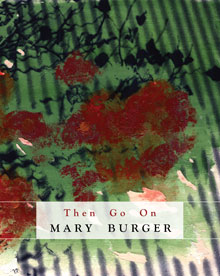by Melissa Barret-Traister
The avant-garde style of Mary Burger’s writing arrives as a contemplation of the space between sending and receiving. The prose poems, or essay-like poetic explorations demonstrate a close attention to reality. The voice that guides the text is one of ebb and flow towards the cultural, philosophical, and social realities of modernity. In the poem “Orbital,” “A certain comfort with motion, at any scale, lets you shift between here, in this kitchen, and here, in this coastal weather pattern, and here, in this planetary orbital path, and here, in this unfurling galaxy.” The poem unfolds upon itself in moments like these, as if to illustrate that multiplicity is indicative of the human condition. To exist one must occupy numerous places all within the confines of the present moment. Writing towards the continuous epiphany of what it means to be fully alive, “The Current” shows Burger writing of that liveliness as “And our existence here due to the act that there are those willing to work for the only-imaginable.” The implication is that the dreamy state of one human being’s imagination leads to a sense of progress for society. Of the hope for humanity, the prose poem continues with “This paradigm shifts so that words are as nimble as neurotransmitters. Like a small chemical messenger, a word can do anything you can think of. A word can move muscles. A word can hold eyes.” Just like speech, the poetic prose located on the space of white pages bound in book form help to awaken the reader. Returning to that sense of ebb and flow, the reader is asked to think towards “A risk. To risk a little every day. To make sure you want it still. Invite opponents to attack. Risk gravity, velocity, impact, mass. Some can’t live without challenge. Some can’t ask.” As if to pull on the glorious idea of what it means to be fully able to create a once wild and precious life, the intention seems to be one of igniting a passion for luminous elements: speech, movement, art, nature, and even the seemingly ordinary right to dream.
Mary Burger is a writer, editor, and publisher. Her books include the following: Sonny (Leon Works, 2005), The Boy Who Could Fly (Second Story Books, 2002), Thin Straw That I Suck Life Through (Melodeon, 2000), and Then Go On (Litmus Press, 2012) amongst others. She is co-editor of the anthology Biting the Error: Writers Explore Narrative, and of Narrativity. She also edits Second Story Books. She lives in Oakland, California.
Reviewer: Melissa Barrett-Traister was one of Bombay Gin Literary Journal’s Audio Archive Editors. She is a graduate of the MFA Writing & Poetics at Naropa University’s Jack Kerouac School of Disembodied Poetics.


